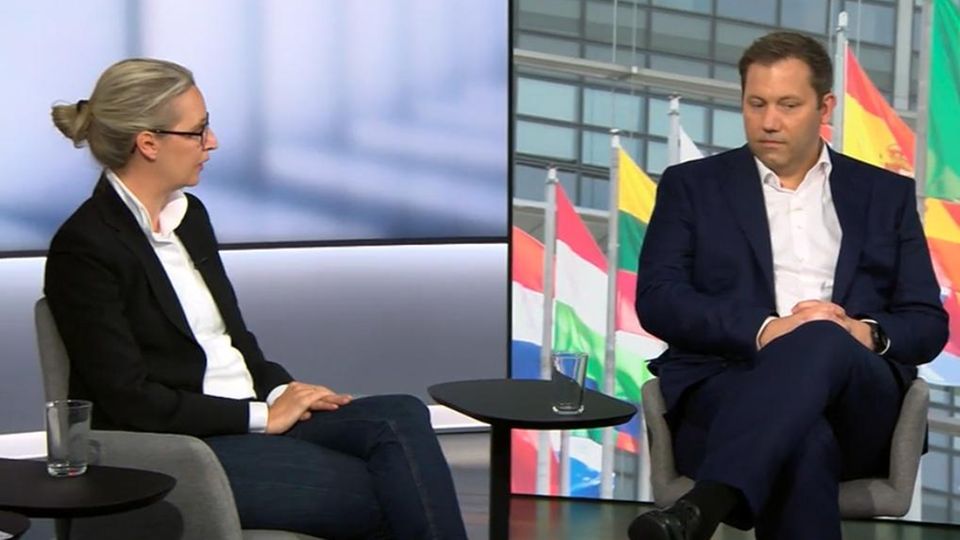analysis
The AfD is back – and is about to conquer East Germany. The starting position for the state elections seems clear. Or is it?
The trend has been evident in the polls on East Germany for a long time – regardless of scandals, large demonstrations or the new competition from the Sahra Wagenknecht (BSW) alliance. This trend was clearly confirmed on election Sunday: the AfD controls almost the entire country in the east. With a few exceptions, the voting cards are colored blue.
The party has thus consolidated its position as favorite around three months before the state elections in Saxony, Thuringia and Brandenburg. This is also confirmed by the results of the local elections, which took place almost across the board in eastern Germany. After the party had already won the majority of district councils in Thuringia two weeks ago, it was even more successful in Saxony on Sunday. According to preliminary results, it is only in the district of Zwickau that it does not have the largest faction.
The AfD once again achieved its record result in the Görlitz home district of AfD federal leader Tino Chrupalla with almost 36 percent. As is well known, Prime Minister Michael Kretschmer also lives there, and he wants to win the state election for the CDU on September 1st.

“You just called me and the party Nazis”
01:38mins
AfD clearly ahead of CDU in European elections in Saxony
The same picture emerges in Brandenburg. With the exception of Potsdam and the surrounding area, the AfD is in the lead there; in the Spree-Neiße district it even reaches almost 40 percent.
But what does all this mean for the state elections in September? Apart from the fact that different rules and circumstances will come into effect then, the mood seems clear enough.
This is Saxony, for example. Here, the AfD received 31.8 percent in the European elections – ten percentage points ahead of Kretschmer’s CDU. Their coalition partners, the SPD and the Greens, received 6.9 percent and 5.9 percent respectively. That makes a total of 34.6 percent for the shaky Kenya alliance.
Translated for the state election, this would mean: In order to continue to govern, the coalition would have to rely on the support of Sahra Wagenknecht’s troops, the BSW has shot from zero to 12.6 percent.
In Thuringia, the Left Party collapses despite Ramelow
And then there is Thuringia, the state in which a prime minister was first elected with AfD votes in 2020, then a left-winger came into office, who has since led Germany’s only minority government. Here, the AfD increased by a good eight percentage points to 30.7 percent – and is thus clearly in first place.
The CDU, on the other hand, bucked the trend and lost even more shares, and had to settle for 23.2 percent. The Left Party plummeted to a measly 5.7 percent despite its Prime Minister Bodo Ramelow. The Greens and FDP also halved their shares, to 4.4 and 2.0 percent respectively – while the BSW even received 15.0 percent. The SPD also suffered losses, reaching 8.2 percent.
For September, this means that a majority government made up of the CDU, BSW and SPD would be mathematically possible. At the same time, the probability has increased that the AfD will win so-called blocking minorities, at least in Saxony and Thuringia. If it wins more than a third of the parliamentary seats, it can block judicial elections and constitutional amendments, among other things.
Will the prime ministers’ bonuses work again this time?
Nevertheless, caution is advised. The 2019 election year showed how much can happen in one summer thanks to the bonuses given to the prime ministers. In Saxony, for example, the CDU was already just behind the AfD in the European elections – and fought its way back to first place in the state elections with a brilliant final spurt by Kretschmer.
The Thuringian Left managed an even more impressive comeback five years ago under Ramelow: after 14 percent in the European elections, it won the state elections with 31 percent – but at that time without competition from the BSW
Either way, Thuringia in particular shows that nothing has been decided yet. After the state AfD led by Björn Höcke failed to secure a district administrator or mayoral post in the first round of local elections two weeks ago, it also lost all the important runoff elections on Sunday.
Incidentally, neo-Nazi Tommy Frenck also lost the runoff election for district administrator in the southern Thuringian district of Hildburghausen. Nevertheless, he received a good 30 percent. That was almost 2,000 votes more than in the first round.
Source: Stern
I have been working in the news industry for over 6 years, first as a reporter and now as an editor. I have covered politics extensively, and my work has appeared in major newspapers and online news outlets around the world. In addition to my writing, I also contribute regularly to 24 Hours World.




